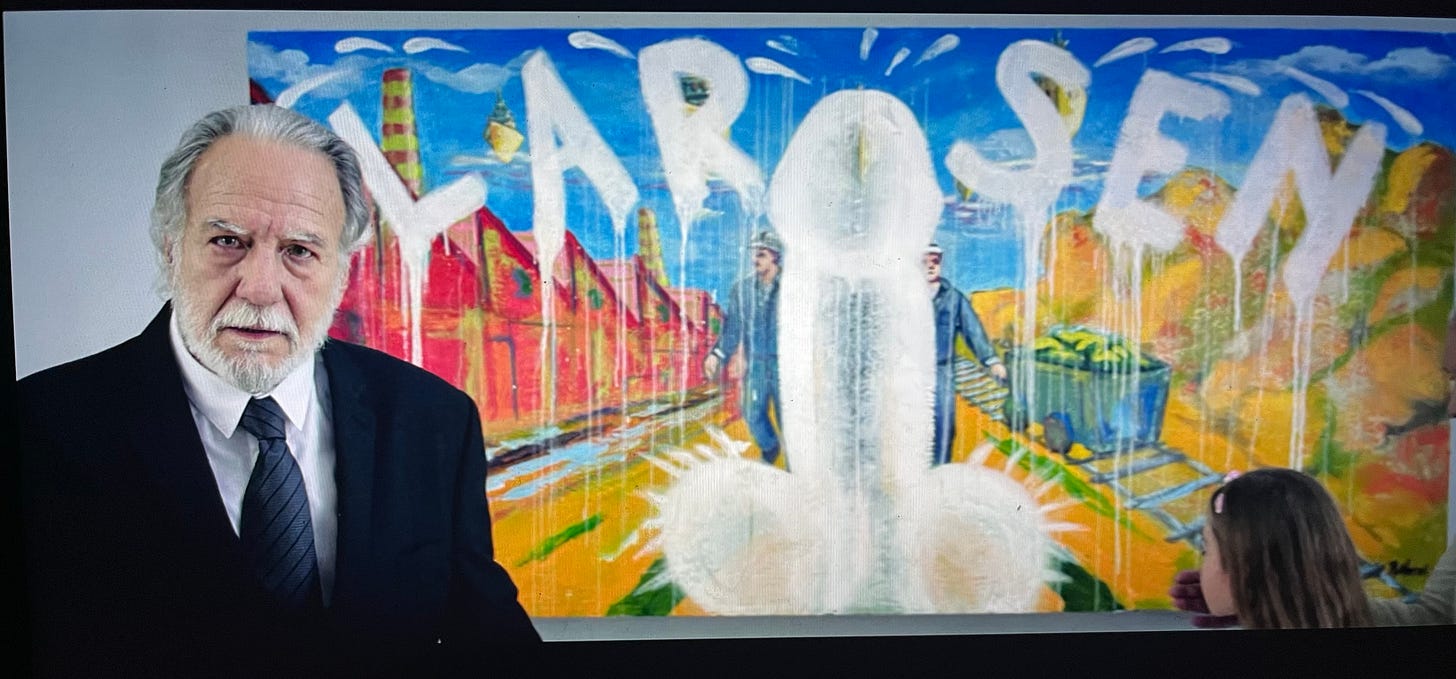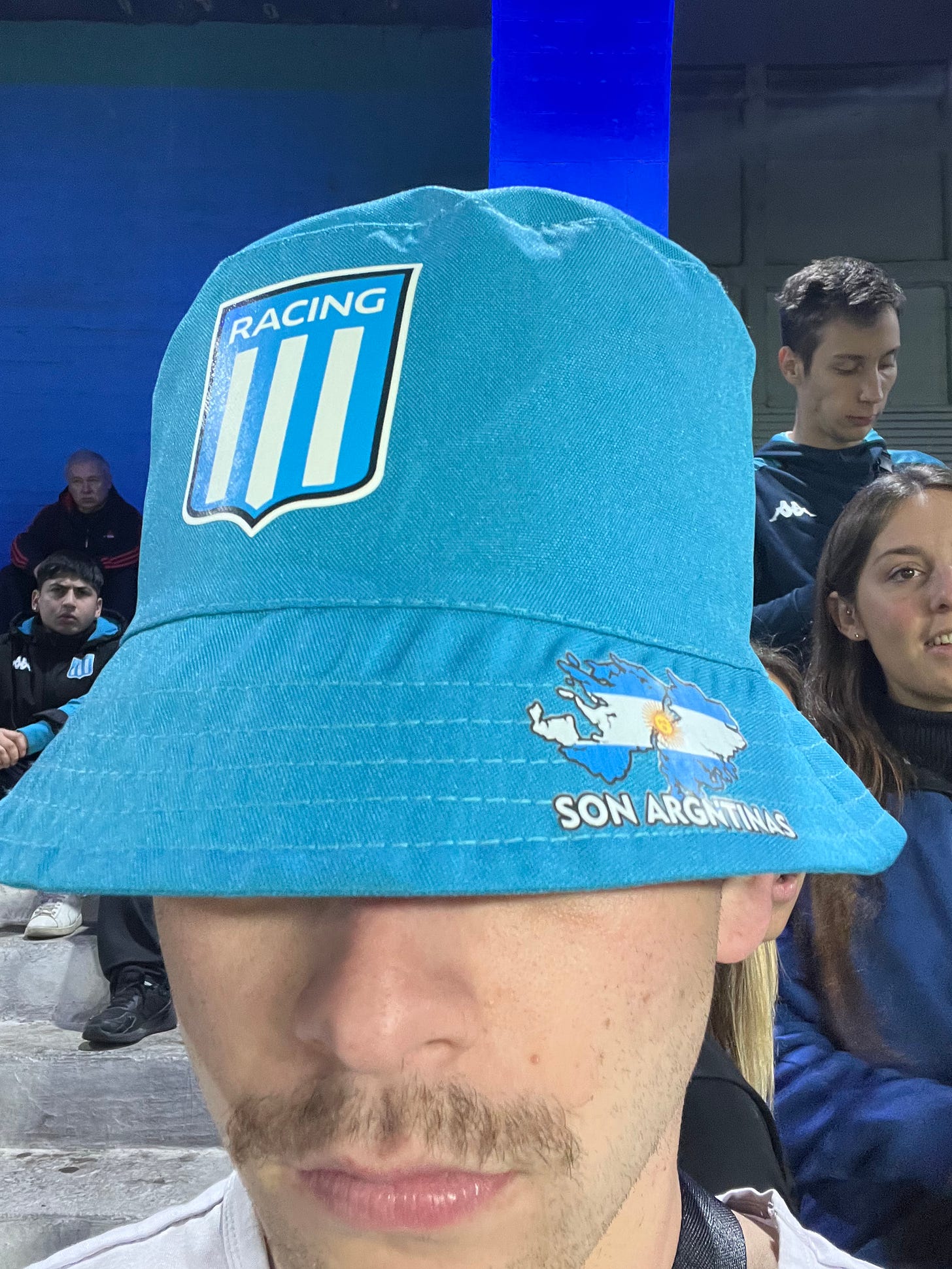🇦🇷 Days 18/19/20: Anatomy of Argentine Scenes
Cinema and sport as stages for exaggerated drama, the Porteño way
A few nights ago, I watched what I believe to be one of the most perfectly executed movie scenes of my lifetime. A perfect set-up, raucously funny writing, fully immersed character acting, and a climax that makes the viewer ashamed to find themselves cackling. In other words, like a Dave Chappelle special, it’s the best of comedy.
Mi Obra Maestra is a 2018 Argentinian flick set in the city I currently inhabit, Buenos Aires. Renzo Nervi is an aging, cantankerous painter, who enjoyed some success in the ‘80s but is now past his prime and struggling to pay rent. His longtime confidant, the slick art dealer Arturo Silva, does his best to gin up interest in Renzo’s work, but the artist does himself no favors. After landing a commission for a lobby decoration at a self-serious corporation, Renzo self-sabotages by spray painting a depiction of male extremities with the company’s name over a perfectly digestible work of art.
This is the last straw for Arturo, who quite reasonably drops Renzo as a client. With no money left over from his glory days, Renzo is evicted from his town house, and has his possessions thrown out on the street. This is where the motion picture magic begins.
Renzo gets up from his couch, which is planted on the concrete with a police officer keeping watch, and heads to the nicest restaurant in town. I’ll let the scene speak for itself.
Karma short-circuited. Renzo forces the restaurant’s hand, allowing him to walk away from his lobster and Italian grappa at no cost, insults an innocent man on the way out, and is immediately struck by an oncoming truck. The movie hinges on this scene, like the Argentinian squad relied on a left-footed pibe from Rosario during the World Cup. It sets up a situation in which Arturo is forced back together with Renzo by a hospital bed, where they draw up a scheme to fake the artist’s death in order to boost the prices of his art. This is because, of course, the porteño mentality is not to meet hard luck with despair, but overly-dramatic ingenuity, tinged with dark humor.
It is somehow as funny as it is deeply ironic, like this video of a man who pledges allegiance to the ever-inflating peso while admitting to saving his money in dollars.
 Tiktok failed to load.
Tiktok failed to load.Enable 3rd party cookies or use another browser
If it is drama, sometimes simply for the sake of drama, that one craves, they should firmly plant themselves in Buenos Aires. And ojalá, revel in the absurd passion of Argentine fútbol, simply another stage for the expression of extremes.
On Thursday evening, I met up with three thirty-ish men wearing mafia-style track suits outside a Shell gas station in the San Telmo district. The previous day, one of the men had pulled up outside my apartment building, and I somewhat indiscreetly dropped thirty thousand pesos in his passenger seat, before he said "nos vemos mañana.”
The truth is, this whole situation was sketchy, but attending a high profile Argentine soccer match is not as simple as logging onto StubHub. Men have to be paid, things you don’t need to know about need to be taken care of, all for a guy named Mariano to WhatsApp message you a PDF ticket as you’re walking into the stadium, 20 minutes from kickoff.
I was evidently not the only one to have employed these guys for logistical and protective services. About nine others arrived to the gas station around 3:45, all foreigners, though all but one from other Latin American countries. I felt a bit bad for the solitary Scotsman in our circle, who spoke no Spanish and was probably the most easily identifiable gringo I’d ever seen with a towering, pasty frame. He was chipper and happy to be along for the ride, though, and I made sure to keep him close by. Mariano and crew all claimed to speak English, but let’s just say that like the lobster and grappo, that bill wasn’t getting paid.
Each of the three men had their own, rather small vehicle, so we split up into Toyotas and Fiats for the 30 minute drive to the barrio of Avellaneda. Immediately, the landscape started to change, from a dense capital city to something more akin to outskirts. Apartments are still the only mode of living in Avellaneda, a middle to working-class provincial town, but they were spread out further, intermixed with big-box hardware stores and office parks.
I was seated next to Alexis, about my age and from Sinaloa, Mexico. He was in Argentina for the sole purpose of attending fútbol matches, and this was to be his third. At least, his main purpose was to attend matches. He also evidently quite enjoyed drinking alcohol, regaling me of a story about the previous Sunday after attending the Boca Juniors-Racing game at the famous La Bombonera. After the match, Alexis had a few too many fernet con coca, falling backwards in a nightclub and fracturing his skull. He was taken to the hospital, where a few Peruvian nurses took care of him until Tuesday, giving him stitches and allowing him to sober up. Alexis interspersed this tale with bouts of laughter, as if the whole thing was a fond memory. Public hospitals offer free health care, even to foreigners in Argentina, so he didn’t pay a dime. “They were scolding me, saying ‘you realize if you were in Europe, you’d be screwed” he recounted to me in Spanish. “I said, all due respect, I’m not in Europe, this is Argentina baby! ahuevo!” Quite the back seat-mate.
We arrived in the equivalent of a Walmart parking lot, a few blocks from Estadio Presidente Juan Domingo Perón, where pre-game party buses were rolling down the street, blasting music, fans waving flags out the windows and singing. Our walk towards the stadium was a cavalcade of street vendors selling team apparel, food, and most importantly, alcohol (banned inside the stadium, for what I can assume are valid reasons). Alexis eyed the man selling fernet, before passing in favor of a lager. Impressive restraint. I purchased a Racing Club bucket hat, complete with some Islas Malvinas insignia to demonstrate my newly-found love for soccer and Argentinian nationalism.
Racing Club’s hinchas have more than 100 unique anthems, the kind of depth needed when one is expected to belt out lyrics for the full 90 minutes. I had no frame of reference for these songs, but caught onto one in particular, in which the crowd simply screams “HIJODEPUTA” at the referee, or amarilla at a sustained tempo. Long memory, Argentines.
Racing was up against Flamengo, the most popular club team in Brazil, in the group stage of the CONMEBOL Copa Libertadores tournament. The tournament pits the best teams from each country in South America in a months-long round-robin, followed by knockout stage to crown the champion of the continent that liberated itself from the Spanish and Portuguese. Flamengo is the defending champion, and this was to be a tough match. Mariano, not wanting to jinx his players, told me we were definitely going to lose.
And it certainly seemed that way in the first half. Gabriel Hauche, the beloved veteran from Remedios de Escalada, earned two yellow cards in a matter of minutes and was sent off, creating a lopsided advantage for the Brazilians. They quickly capitalized with a beautiful set piece, and I sat on the concrete steps at halftime among a mostly dejected crowd.
Luck on the pitch, like a nation’s economy, or the price of one’s art, can turn rapidly, however. Flamengo earned a red card of their own in the second half, and Racing was granted a relatively close free kick. I raised up my phone, just in case, and captured the bedlam.
I was quite enjoying the dynamic to my left. It appeared to be two dads, both still wearing dress clothes from a day at the office. They had each brought their children, of varying ages, genders, and levels of interest. The dads, however, clearly shared a lifelong bond over this team, with all its trials and tribulations. They grasped each other during particularly emotional chants, screaming the lyrics with no need for a lyric sheet. The children looked equal parts bemused, mystified, terrified. When Racing scored, however, they joined their fathers in pure ecstasy.
Fittingly, a tie for my first international soccer match. The papers were generally positive of the result, giving manager Fernando Gago props for rallying his team after being down a man. Racing is now in firm position to advance past the group stage, which should help mitigate the fall out from a subpar performance in the domestic league (they currently sit in 14th place). The fans outside the stadium sure seemed pleased with the draw. Oh Argentina, never restrain your feelings.







